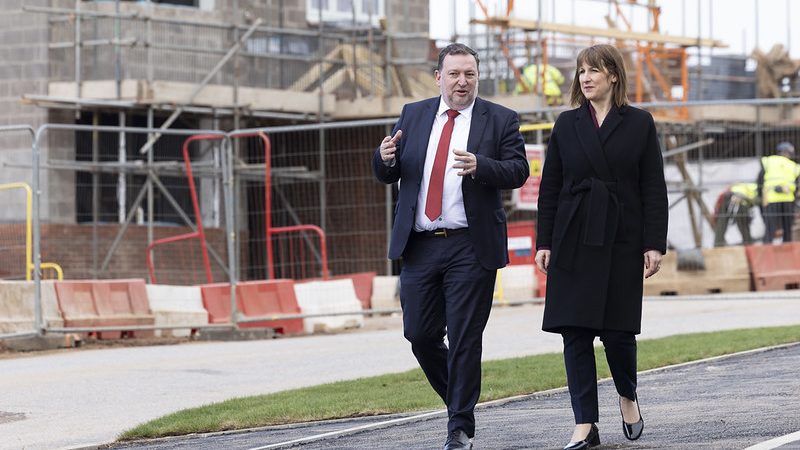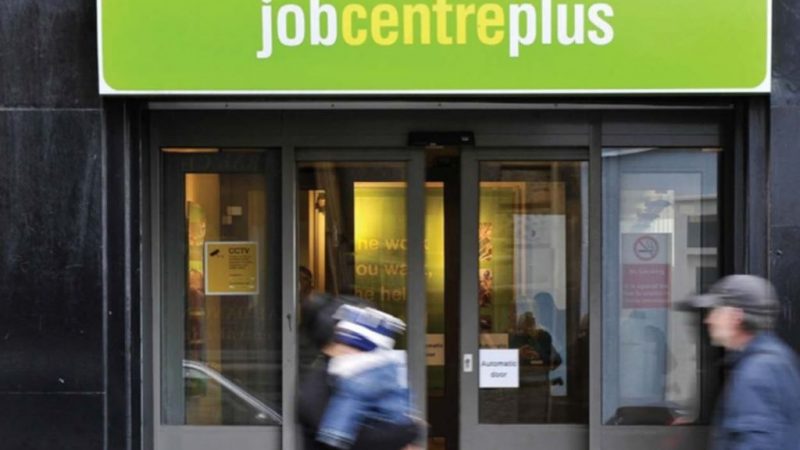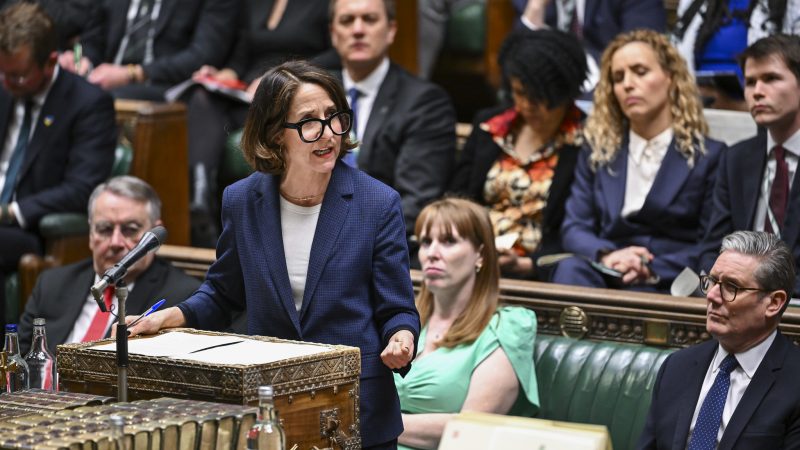UK
‘Welfare reforms threaten to alienate Labour’s own voting coalition’

No Chancellor wants to be compared to Kwasi Kwarteng’s short-lived time at the Treasury.
But unfortunately, that’s increasingly the position Rachel Reeves finds herself in.
Ipsos’ snap-polling conducted immediately after this week’s Spring Statement shows half the public (51%) thinks Rachel Reeves is doing a bad job as Chancellor. Concerningly for her, this is up 7-percentage points from last month. Even worse, this is now just short of the verdict they delivered to Kwarteng after his infamous “mini-Budget” when he registered a 53% disapproval rating.
Reeves faced no easy challenge in reassuring the public. She was boxed in by her determination to stick to her fiscal rules and avoid extra borrowing, while also being locked into commitments to not raise taxes.
With limited options, she also had to contend with the doom music of the OBR halving their 2025 growth predictions to 1%.
It’s a classic polling story
But the public’s reaction shows she’s failed in her newly found mission to inspire optimism. Three in five (57%) say the Statement has left them more concerned about Britain’s economy than reassured. This is 12-percentage points higher than the proportion who said the same after her first Budget last October.
It’s a classic polling story as most of her spending announcements are popular when asked about individually, but collectively voters fear the overall package. Over half are in favour of spending more building affordable homes, training more construction workers and increasing defence spending next year. Besides boosted military spending, however, many of these polices haven’t cut through, with more people saying they haven’t heard of them than have.
READ MORE: List of councillors quitting over welfare amid further cuts
Welfare reform is the announcement which voters most recall hearing something about (unsurprisingly given it was trailed a week prior). It’s these policies where opinion is most divided. Around one in three (36%) support reducing welfare spending by changing disability, sickness and universal credit benefits, while the same proportion oppose it (35%). That’s not a recipe for a well-received fiscal event.
More widely these reforms pose a narrative issue for the Government. Ministers argue it’s a Labour value to encourage people back into work, but most now say “working people” are treated worse than they should be by the government (55%), while believing the opposite about “people on high incomes” (54% saying better than they should be). The welfare reforms also garner far more support from 2024 Conservatives than from Labour voters (48% vs. 36%).
At some point, you need to remind your own voters why they backed you
Here lies the electoral risk for the future. As well angering Labour MPs, welfare reforms threaten to alienate the government’s own voting coalition. Reducing poverty is among the top three priorities for 2024 Labour voters, but slightly more say they are doing a bad than good job in delivering (33% vs. 24%). Assessments that welfare changes could result in 250,000 more people overall living in relative poverty, including 55,000 children, will do little to convince them otherwise.
At some point, you need to remind your own voters why they backed you. If you don’t, they won’t return. That is a real challenge Labour is facing right now. Immediate reactions are not always the final word on how the public remember political events, but first impressions count, and Labour now need to get on with delivering.
A partial silver lining for the “securonomics” Chancellor is that these savings meant protecting her “fiscal headroom”. Unfortunately, this buffer was wiped out by President Trump within hours of her being at the dispatch box, with his announcement of 25% tariffs on UK car manufacturers (and potentially more to come).
Unless a trade deal is secured between the UK and USA, then Reeves is already back at square one and looking for more difficult savings ahead of her Autumn Budget. It could be then that the pressure reaches boiling point.
Welfare: Labour criticised for not consulting on disability and poverty in policymaking forum for next manifesto

Labour has been accused of seeking to constrain party discussion over future welfare policy by a member of its governing body, just as the government unveils further cuts to benefits.
Chancellor Rachel Reeves announced further welfare cuts during her Spring Statement on Wednesday, in a move that has dismayed many Labour figures.
The word “welfare” was notably only mentioned twice in the 2024 general election manifesto – in relation to animals – and the word “benefits” conspicuous by in its absence for the party proud of setting up the welfare state.
Now some members will fear the next manifesto may be little different. Ann Black, Constituency Labour Party representative on the national executive committee, suggests that participants in the party’s national policymaking forum (NPF), which drafts the broad policy programme that future manifesto commitments are often largely drawn from, have been told to focus on “narrow topics” in this cycle.
Black wrote in an report for members this month that she was “concerned” at the changed role of NPF – the official mechanism by which general election policy platforms are formulated.
But the party’s chair Ellie Reeves is reported to have since said the topics are only “starting points” and local parties can discuss “whatever they wish”.
Blair ‘understood arguments had to be explained and won’
She said there will be “no formal consultation” on disability support or child poverty in the NPF’s Breaking Down Barriers commission, one of six sub-groups looking at particular policy areas. Instead the commission’s members have been tasked with discussing raising the proportion of school-ready five-year-olds from 67% to 75% by 2028, a key recent Labour commitment.
Black wrote: “The commission’s remit includes education, work and pensions, equalities, and culture, media and sport, but there will be no formal consultation over child poverty, where the two-child limit and the benefit cap penalise children in larger families, nor on winter fuel payment, where the pension credit threshold of £11,500 is far too low, nor on disability support including personal independence payments designed to give disabled people an equal chance in life, nor the bedroom tax, nor the funding crisis in higher education.
The longstanding NEC member said that former Prime Minister Tony Blair – who set up the NPF – understood arguments “had to be explained and won among the wider movement”, and recognised that success ‘”did not simply mean keeping enough MPs in line”.
She said the NPF produced three wide-ranging documents in its first year in 1998: “One on health, one on crime and justice, and one on welfare reform, including pensions and benefits, specifically to address issues which members and voters cared about.” These documents were discussed by the full NPF meeting, in person, before circulation – with members keen to engage with them, she said.
The original purpose of the NPF was to involve members in discussions, Black said, especially on “contentious matters and tough decisions”.
Suggested starting points
Black also revealed that at yesterday’s national executive committee meeting, party chair Ellie Reeves said the papers were only “suggested starting points”, however, and parties could discuss “whatever they wish”.
Black writes in a forthcoming report on the meeting: “As chair of the national policy forum Ellie was pleased to announce that the six policy commissions are up and running, providing essential links between government and party. Each commission has its own workplan and is publishing a paper on 31 March, open for consultation until 8 June 2025. The joint policy committee agreed that these first-year documents would focus on fixing the foundations, with specific topics defined elsewhere.
“Ellie confirmed that the papers are suggested starting points, and local parties are encouraged to discuss whatever they wish. For instance, Breaking Down Barriers focuses on raising school-readiness among five-year-olds from 67% to 75%. This commission also covers the whole of the departments of education, work and pensions, and culture, media and sport, so it includes pensions, winter fuel payments, child poverty, universal credit and sickness and disability-related benefits.
“In addition every paper includes a question about the implications of its proposals for women, Black, Asian and minority ethnic people, LGBT+ people, disabled people and those with other protected characteristics. And 8 June is not an absolute cutoff for everything – members can feed views in all year round. So there are plenty of opportunities to contribute.”
What is the NPF?
The NPF consists of around 200 representatives drawn from across the Labour movement, many of them directly elected, who then consult with the general public, party members, affiliates and experts on those key policy areas.
This policy consultation is then used to create an annual report, which is debated and voted on at conference.
Once approved, it provides the main springboard for policy ideas for the manifesto, although many further commitments made it into the manifesto – or disappeared from the NPF – during the last policymaking cycle in response to political developments.
The final thrashing out of what makes the cut for the manifesto takes place at a Clause V meeting. The last one passed with limited public political rows, bar Unite declining to fully endorse the plans.
Labour was approached for comment.
Spring Statement: List of councillors quitting over welfare amid further cuts

The deputy leader of Rotherham Council has become the latest Labour councillor to quit the party over the government’s welfare reforms and cutbacks, with ministers expected to confirm another £500m in cuts today.
Welfare reforms unveiled by Work and Pensions Secretary Liz Kendall aim to save £5bn as part of today’s Spring Statement – with measures including restricting eligibility to personal independence payments for disabled people.
Discontent is likely to flare up further today as ministers are expected to unveil a further £500m in cuts, with universal credit incapacity benefits thought likely to be frozen until 2030 and the basic rate of universal credit reduced in 2029.
Meanwhile the government impact assessment on reforms is expected to be a flashpoint if released as expected alongside the Chancellor’s statement, laying bare the potential human impact of the changes.
One backbench MP told LabourList ahead of the statement they were “keeping my fingers crossed that more welfare cuts aren’t coming” as reported.
READ MORE: MPs on Spring Statement: ‘Let’s soothe the nation, not kick it in the teeth’
Rotherham Council deputy leader and lifelong Labour member David Sheppard described the changes as “unconscionable” this week, and hit out at the government for “targeting people who need support the most”.
He said: “I have always held the belief that government should do what it can to equalise the injustices within society.
“Sadly, this and other recent announcements have led me to conclude that this is currently not the case.”
Council leader Chris Read described Sheppard’s decision to quit the party as “deeply disappointing”, calling him a “hardworking Labour councillor for the last nine years”.
Sheppard’s resignation from the party is the eighth in recent weeks in reaction to the government’s welfare reform proposals, which include five Labour councillors in Dudley. Former Labour MSP Neil Findlay also announced his resignation from the party, claiming the changes to benefits “punish and stigmatise the weak, poor and the vulnerable”.
The government has defended the reforms, arguing they are needed to get people who are on long-term sick leave back into work and to cut Britain’s ballooning benefits bill.
Ahead of today’s Spring Statement, we are compiling a rolling list of Labour councillors who have quit the party over the government’s benefit reforms. If you know of any councillors to add to this list, email us at mail@labourlist.org.
Following resignations in Dudley, a West Midlands Labour spokesperson said: “Labour inherited a broken welfare system from the Conservatives, which risked a generation of young people being written off and millions of people who want to work not getting the support they need.
“Labour will deliver a social security system that is fit for the future.”
Pete Lowe (March 19)
Councillor Pete Lowe, who served as leader of the Labour group in Dudley, resigned from the party after more than 40 years of membership. He described his decision to quit as “heartbreaking but unavoidable”.
Lowe also reportedly played an important role in Richard Parker’s campaign to become the West Midlands’ first Labour mayor last year.
In a letter of resignation addressed to the Prime Minister, he said: “I have finally concluded, and it’s heartbreaking to say so, that my party has left me behind, found new friends and priorities in the city and the markets, whilst the very people who look to the party for a real alternative, good honest working-class people in the Black Country and beyond have been abandoned.
“I am not leaving the Labour Party – the Labour Party left me some time ago.”
He has since formed a new breakaway group of councillors with others who have also resigned from the Labour Party.
Karl Denning (March 20)
Councillor Karl Denning quit claiming that the national party had “left me behind”.
Denning, who was blinded in a workplace accident and is assisted by a guide dog, said that comments made by Wes Streeting “sealed the fact that Labour were not the party I joined to fight for a fair more just country”.
In a letter to the Prime Minister, he said: “I have been asked how I can be a member of a party that is willing to turn on disabled people so easily, and if ‘I’ll be able to sleep at night’.
“After much heart searching and thought, I do not think I can remain a member of the Labour Party. It is one of the most difficult decisions I have had to make.
“I joined the Labour Party fighting for disabled [people] and those without a voice and it seems I leave the Labour Party doing the same thing.”
Denning has since joined Lowe’s breakaway group of councillors.
Peter Drake (March 20)
Dudley councillor Peter Drake said that he could not defend a Labour government “which does not and will not represent the working class and ordinary people,” as he resigned from the Labour Party.
Drake, who had been a member of the party since 2015, said: “All I have ever wanted to do is help working-class people; but the sad reality I have woken up to is that the national Labour Party is no longer the voice of the working-class.
“Since winning the general election, Keir Starmer and his Labour government have shown no real interest in improving the lives of normal working people. That is a facade they used to win votes from people who desperately wanted change.
“I cannot and will not defend the indefensible. I will not tolerate the punitive, uncompassionate, downright idiotic policies that we see from Keir Starmer’s government. They have betrayed the Labour movement and offer no alternative to permanent austerity.”
Drake has since joined Lowe’s breakaway group of councillors.
Matt Cook (March 20)
Dudley councillor Matt Cook quit the Labour Party after claiming the party had “moved away from their founding principles”.
In a statement, Cook, who was elected as a councillor last year, said: “I feel it has become increasingly disconnected from the needs of the people it was meant to represent, and I can no longer in good conscience remain a part of it.”
Cook told the Birmingham Mail that his family had always voted Labour, but that the changes to the welfare system would affect some of them.
“I have put my heart and soul into being a Labour member and councillor but it is just not working.”
Cook has since joined Lowe’s breakaway group of councillors.
Karen Constantine (March 22)
Deputy leader of the Labour group on Kent County Council Karen Constantine quit the party after more than 40 years of membership, citing the welfare reform announcement as part of the reason for her decision.
She wrote to Keir Starmer to express her concerns about the impact of the changes on the most vulnerable.
Constantine said: “The party has strayed from its core values, abandoned hope, and forsaken the democratic principles that I and many others hold dear. It has lost its way, it has left members like me.
“The recent proposed cuts to welfare have already instilled deep concern and will only further exacerbate the struggles of our society’s most vulnerable. This includes the disabled and many young people who are already facing significant hardship and difficulty in my division of Ramsgate.
“While Labour speaks of getting people back to work, it offers no viable solutions for the dire employment opportunities in my area.”
She also expressed anger at the “ongoing refusal to apologise for historic forced adoptions”.
Luke Hamblett (March 22)
Dudley councillor Luke Hamblett announced he would be leaving the Labour Party “with a heavy heart” following decisions from the government, including the winter fuel allowance and changes to health-related benefits.
In a statement shared on social media, Hamblett said: “Last year, I was full of optimism when I was elected to serve Quarry Bank and Dudley Wood. Like the rest of the country, I believed change was on the way.
“With dismay at first and then disgust, I watched as a ‘Labour’ government kept the two-child benefit cap, removed winter fuel payments from millions of pensioners and are now targeting people with disabilities. Enough is enough.”
READ MORE: Spring Statement: ‘The Chancellor must not make foreign aid cuts worse’
John Warmisham (March 23)
Veteran councillor John Warmisham accused Labour of “losing its moral compass” under Keir Starmer’s leadership as he resigned from the party. Warmisham, who has served as a Salford councillor for 34 years, said in a letter to the city’s mayor that Labour “no longer represents the communities that it was set up to serve”.
He said: “Cutting the welfare benefits to the disabled, the sick, the poor and the vulnerable, whilst committing billions of pounds to arms and supporting wars is immoral, as well as government ministers pushing pensioners, families and children further into poverty.”
David Sheppard (March 25)
Deputy leader of Rotherham Council David Sheppard, who was first elected in 2016, resigned from the Labour Party in protest over the government’s welfare reforms. While he said he supports the work Labour is doing at a local level, Sheppard said the government had “chosen to target people who need support the most”.
Matt Renyard (March 26)
Southampton councillor Matt Renyard, who had been involved with the Labour Party for 15 years, announced his defection to the Green Party after claiming it is “becoming increasingly difficult to speak honestly” within the party locally and nationally.
Renyard, a former council cabinet member, said: “Labour have broken my heart. They used to be the party that represented everyday ordinary people, fighting for the poor, the vulnerable, and both the working and middle classes. Following the first nine months of this newly elected Labour government, it is clear that Labour has lost its way.”
Welfare reform: List of Labour MPs prepared to rebel against benefit changes

More than 20 Labour MPs have said publicly that they will not back the government when proposed welfare reforms are voted on in Parliament.
Last week, Work and Pensions Secretary Liz Kendall unveiled the “biggest shake up to the welfare system in a generation” in a bid to cut the country’s benefits bill by around £5bn.
However, measures to restrict eligibility for personal independence payment and cutting and freezing the health element of Universal Credit for new claimants have proved controversial among some Labour MPs.
Following the publication of an impact assessment into the reforms by the Department of Work and Pensions, at least eight Labour MPs have said they will vote against the reforms to the welfare system, with several more signalling their opposition to the plans.
Speaking on the Today Programme, Chancellor Rachel Reeves defended the government’s reforms to welfare and said: “This is about reforming the system, to get more people into work, to have fulfilling careers and have more money in their pocket.”
Several of those who have publicly said they will oppose changes to welfare are on the left of the party, including Nadia Whittome, Brian Leishman, Kim Johnson and Richard Burgon.
Others, including Stella Creasy and Steve Witherden, have posted publicly about their opposition to the changes but have not explicitly said they would vote against the proposals when they come to a vote in the Commons.
Outside of Parliament, Greater Manchester Mayor Andy Burnham has said that the government is making “the wrong choice” by restricting eligibility for disability benefit.
We are keeping a rolling list of MPs who have said they are prepared to rebel against the government over the changes to health-related benefits – if you see an MP who should be on our list, please email us at mail@labourlist.org.
Labour MPs who have said they will rebel against the government
- Diane Abbott, Hackney North and Stoke Newington
- Lee Barron, Corby and East Northamptonshire
- Lorraine Beavers, Blackpool North and Fleetwood
- Richard Burgon, Leeds East
- Ian Byrne, Liverpool West Derby
- Neil Duncan-Jordan, Poole
- Cat Eccles, Stourbridge
- Chris Hinchliff, North East Hertfordshire
- Imran Hussain, Bradford East
- Kim Johnson, Liverpool Riverside
- Mary Kelly Foy, City of Durham
- Ian Lavery, Blyth and Ashington
- Brian Leishman, Alloa and Grangemouth
- Emma Lewell-Buck, South Shields
- Clive Lewis, Norwich South
- Rachael Maskell, York Central
- Andy McDonald, Middlesbrough and Thornaby East
- Grahame Morris, Easington
- Connor Naismith, Crewe and Nantwich
- Simon Opher, Stroud
- Andrew Ranger, Wrexham
- Bell Ribeiro-Addy, Clapham and Brixton Hill
- Jon Trickett, Normanton and Hemsworth
- Chris Webb, Blackpool South
- Nadia Whittome, Nottingham East
Zarah Sultana, Apsana Begum and John McDonnell, who remain suspended from the Labour Party, have also said they will not vote in favour of the government’s welfare reforms.
No comments:
Post a Comment